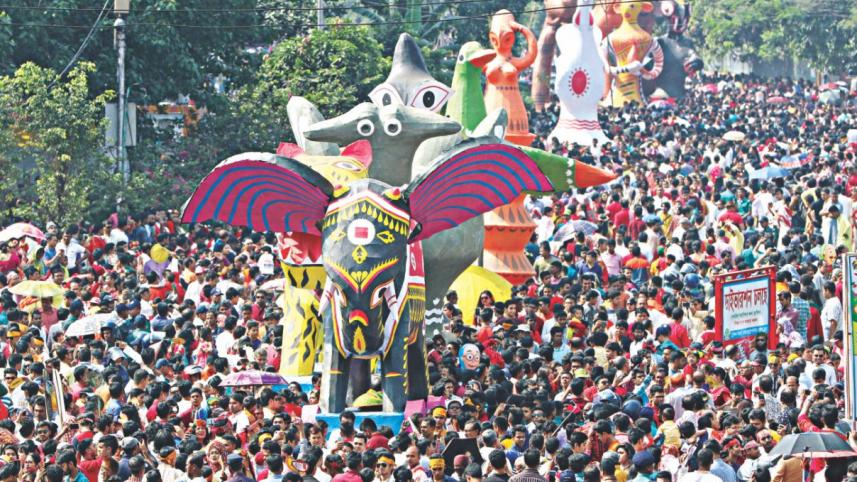Celebrate our unity this Pahela Baishakh

After two years of observing Pahela Baishakh within the confines of our homes, the festivities are back in our lives this year to invigorate us to start anew, while shedding the negativity of the past. That, in fact, is what the theme of this year's celebrations indicates as well, "Tumi nirmolo koro, mongolo kore molino mormo muchhaye." With the threat of Covid largely neutralised through wide-scale vaccination, people are expected to come out in the open to walk on the grass, hear the birds sing and inhale the sweet summer breeze to their lungs' content—all while hopefully maintaining safety protocols. Though the celebrations this year are being tempered down in consideration of Ramadan, we hope the pluralistic spirit of the day endures and carries us through to a better tomorrow.
Pahela Baishakh celebrations transcends all socio-religious barriers or social diktats, and become a unifying force for the people. It is on this day that Muslims, Hindus, Christians, Buddhists and people of other faiths enjoy traditional songs sitting side by side at Ramna Batamul, a popular meeting ground in Dhaka, or mingling at a town or village fair. The Mongol Shobhajatra, or the parade of good fortune that starts from the Dhaka University campus, is a call for peace, harmony and good tidings. Thus Pahela Baishakh, being the biggest secular festival in Bangladesh, strengthens and reaffirms the cultural bond shared by people regardless of what faith or community they are from. As a symbol of resistance against intolerance and communal mindsets since the 60s, the celebration of Pahela Baishakh has become all the more significant in an environment in which the seeds of hatred threaten to sprout.
It is, of course, unfortunate that the Baishakhi downpour is yet to wash away the soot of fanaticism from the hearts of some fellow citizens, who continue to deny the celebration of Pahela Baishakh as a secular event. We hope all security measures will be taken by the administration to make sure the celebrations are carried out safely and smoothly. Let us all join together to celebrate 1429 and all that we share in common—our culture and our love for our country, while remaining respectful of each other and of our differences. That is what the beginning of each Pahela Baishakh has always signified: our ability to come together from our respective backgrounds and celebrate the arrival of the new year with happiness and hope.
We wish our readers and patrons Shubho Noboborsho!



 For all latest news, follow The Daily Star's Google News channel.
For all latest news, follow The Daily Star's Google News channel.
Comments